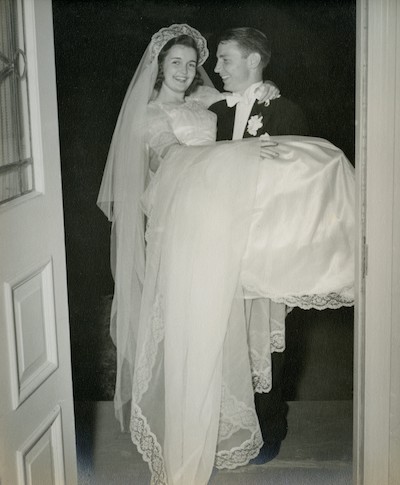
Three weeks later, in an open Scout car, Buster rolls south in a khaki-colored convoy through Gettysburg, Antietam, and along the Skyline Drive to Fort Bragg. In the Carolina Maneuvers, Lieutenant General Hugh A. Drum, Commanding General of the 400,000 soldiers of the “First Army,” sees to it the military might of the new U.S. Army strategically grows bigger and stronger in an all-out sham war over sixteen counties in North and South Carolina.
PFC Buster insists his military service “must of necessity be directed to the improvement of the armed forces of this country, for unless this war is in the end definitely won by the democracies, then any plans that we may have for the future will definitely be destroyed.”

Robin’s sojourn to the El Teniente mining camp, east of Rancagua, Chile is to visit her parents, Dr. Lelia and T. Wayne Skinner, and the home she knew as a child in “Campamento Americano.” Buster anticipates Lelia will ensure Robin returns with “a basic knowledge of home economics, a desire and energy to be a good housekeeper, the knack of making a real home…” Yet from the time Robin disembarks in the port of Valparaiso, it becomes her “summer to play in.”
With the sinking of the USS Reuben James, notably the first U.S. naval warship lost to hostile action of a German U-Boat, the situation turns from serious to grave. Buster obsesses over Robin’s perilous return up the Atlantic coast. In a letter to his bride he avows, “… If you don’t see your duty as I see mine, if you feel you would be happier at home in Chile, than you would be with me wherever I might be, then stay there until your heart calls you back to me.”
The next time Buster sets eyes on his bride will be after her shocking extramarital affair with a ski racer and the December 7 Japanese attack on the U.S. naval base at Pearl Harbor. By way of Pan Am Clipper and Eastern Airlines DC-3 “Silver Sleeper,” Robin returns in time to celebrate their first Christmas. Each young couple’s path advances in lockstep with military training and rank advancement. For the young Bedfords it’s New Jersey and Massachusetts, where their son Bobby is born, to Florida and Louisiana. All the while, Robin’s mother Lelia chases Robin and her sister, Dottie, by way of government censored handwritten letters, often taking… Six Weeks for Boat Mail.
Listen to a Benny Goodman soundtrack while reading Six Weeks for Boatmail, and fully immerse yourself into a personal history of 1940’s family life in WWII America. Bonnie Park’s second book is an entertaining, wartime adventure across disparate continents. The intimate peek into her family’s relationships reveal the War’s societal limitations and beliefs that shape their lives… the author’s untold narrative expertly melds history in tandem with the fates and fortunes of her patriotic family.
Leslie Miller, Editor Reimagining A Place for the Wild